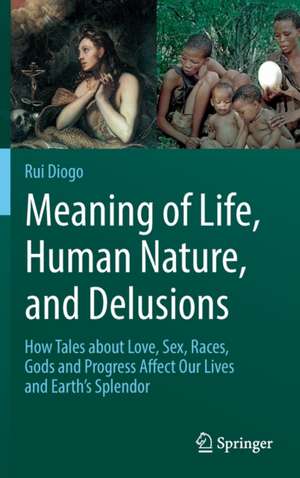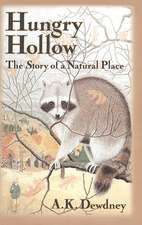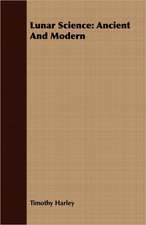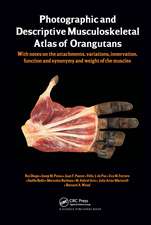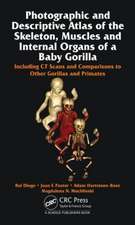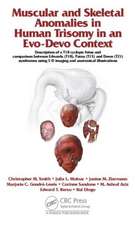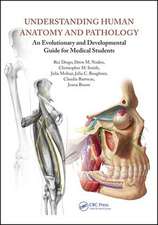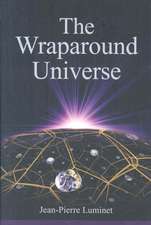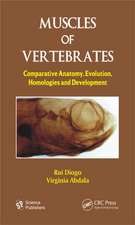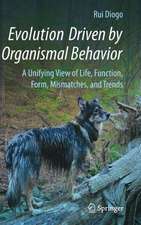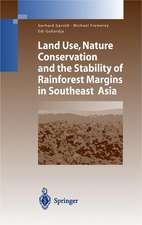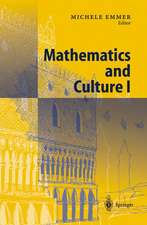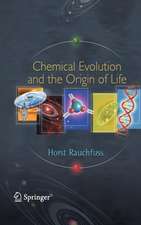Meaning of Life, Human Nature, and Delusions: How Tales about Love, Sex, Races, Gods and Progress Affect Our Lives and Earth's Splendor
Autor Rui Diogoen Limba Engleză Hardback – 15 dec 2021
Whatever are your beliefs, background, education, political views or interests, one thing is sure: this book will engage you, teach you something new, and more importantly make you to re-think deeply about critical aspects of your daily-life, including sex, love, food, physical activities, diseases, work and stress, and how you see and deal with other people, other animals, and the planet in general. Indeed, it focuses on topics that have fascinated people from all places and historical periods since times immemorial: Why are we here? What is the meaning of life? Are we progressing, and will we thrive? It does this by integrating in a unique fashion information from ancient Greek, Sumerian, Hindu, Jewish, Buddhist, Christian and Muslim texts to high-tech brain research, facts about near-death experiences, Covid-19, QAnon conspiracies, virtual reality and dating aps; from Adam and Eve to the rise of misogyny and racism to Black Lives Matter, Me-Too, Hollywood romantic movies and Disney fairy-tales. Contrary to notions about 'human progress' and 'Homo Deus' defended by authors such as Harari, Pinker and Dawkins, it shows that human history instead involves the repetition of similar imaginary tales created by a combination of traits found in other animals and the uniquely human obsession about 'cosmic purpose' stories related to our awareness of death's inevitability. Organized religions appeared later, chiefly during the rise of agriculture and 'civilizations'. Diogo navigates mesmerizing untold stories revealing a paradox: these events and the industrial 'revolution' increased inequality, oppression, slavery, subjugation of women, famines, plagues, 'work', stress, and suicides. Data from psychology, biology, neurobiology, and cross-cultural studies of hunter-gatherers and so-called 'developed' societies reveal an even more profound paradox: within all forms of life, the 'sapient being' is the one immersed in Neverland's world of unreality - truly a Homo irrationalis, fictus and socialis believing in fictional tales about cosmic 'duties', 'romantic meant to be', demons, inferior 'races' and 'genders', conspiracies, and 'justified' slavery, warfare, genocides, and animal abuses. Importantly, such tales play, on the other hand, crucial functions such as help coping with death and a plethora of societal troubles, decreasing stress, or preventing drug and alcohol abuse. An optimist and passionate wondered and wanderer, Diogo provides enthralling details about the history of religion, discrimination, romantic love, warfare, diseases and Earth's biodiversity illustrating how 'virtue is in the middle' and that we - with our intriguing combination of beliefs, bodily needs and desires, artistic abilities, and mismatches between our senses' illusions and the cosmos' reality - are not 'better' or 'worse' than the other millions of captivating living species. This powerful and urgently needed message has critical repercussions for how we understand, care about, and mindfully enjoy living in this splendid planet, in the reality of here and now.
Pre-publication comments:
"I applaud the enormous work that Diogo has invested in this follow-up to his widely acclaimed Evolution driven by organismal behavior book, and the challenge of getting people to think beyond and outside of our usual set of definitions and expectations. The case-studies provided in the book are fascinating and insightful" (Drew Noden, Award-winning Emeritus Professor, Cornell University)
"Rui Diogo is becoming the Slavoj Zizek of evolutionary biology" (Marcelo Sanchez-Villagra, Director of the Paleontological Institute and Museum of the University of Zurich)
Pre-publication comments:
"I applaud the enormous work that Diogo has invested in this follow-up to his widely acclaimed Evolution driven by organismal behavior book, and the challenge of getting people to think beyond and outside of our usual set of definitions and expectations. The case-studies provided in the book are fascinating and insightful" (Drew Noden, Award-winning Emeritus Professor, Cornell University)
"Rui Diogo is becoming the Slavoj Zizek of evolutionary biology" (Marcelo Sanchez-Villagra, Director of the Paleontological Institute and Museum of the University of Zurich)
Preț: 264.47 lei
Nou
Puncte Express: 397
Preț estimativ în valută:
50.60€ • 52.84$ • 41.88£
50.60€ • 52.84$ • 41.88£
Carte disponibilă
Livrare economică 14-28 martie
Preluare comenzi: 021 569.72.76
Specificații
ISBN-13: 9783319704005
ISBN-10: 3319704001
Pagini: 190
Ilustrații: XXI, 863 p. 120 illus., 79 illus. in color.
Dimensiuni: 155 x 235 x 58 mm
Greutate: 1.49 kg
Ediția:1st ed. 2022
Editura: Springer International Publishing
Colecția Springer
Locul publicării:Cham, Switzerland
ISBN-10: 3319704001
Pagini: 190
Ilustrații: XXI, 863 p. 120 illus., 79 illus. in color.
Dimensiuni: 155 x 235 x 58 mm
Greutate: 1.49 kg
Ediția:1st ed. 2022
Editura: Springer International Publishing
Colecția Springer
Locul publicării:Cham, Switzerland
Cuprins
Standing on the shoulders of farsighted humans
Book dedication
Acknowledgements
List of Boxes
Preface
1 Introduction
1.1 Standing on the shoulders of others: a book of thousand different voices
1.2 Notes on interdisciplinarity
2 Death and cosmic purpose of life
2.1 Quests to find a cosmic purpose of life
2.2 Beliefs, religion, and evolution
2.3 Fear of death, purpose, human evolution, and discrimination
2.4 Teleology, morality, organized religions, and advantages of believing
2.5 Beliefs, atheism, and spirituality
3 Our place in nature, progress, racism and eugenics
3.1 'Progress', racism and quests to understand our place in nature
3.2 Cultural, or 'epigenetic', versus innate, or 'genetic', notions of race
3.3 Aristotle, Galen, monkeys, human anatomy, and Chain of Being
3.4 Apes and rise of innate notions of 'race' such as white supremacy
3.5 Apish-humans, Malthus and Darwin's 'struggle-for-life', Freud's psychoanalysis, and eugenics
3.6 Medical experimentation, 'progress', eugenics, and genocide
4 Myths and reality about 'savages' and 'civilization'
4.1 'Savages', 'civilization' and inequality
4.2 Agriculture, labor, slavery, leisure, health and 'progress'
4.3. Hobbes, Rousseau's 'Noble Savage', and violence
5 Sex, love, marriage, 'meant to be', and misogyny
5.1 Teleological stories, homosexuality, romantic love, sex, and marriage
5.2 Agriculture, religion, 'original sin', monogamy, and misogyny
5.3 Women, men, sexual desire and orgasms
5.4 Sex at dawn, Sex at dusk, scientific biases, 'traditional societies', and jealousy
5.5 History of marriage, love and sex, and links to health and happiness
5.6 Misogyny, history, teleology, religion, and Hypatia of Alexandria
5.7 Myths and facts concerning narratives on gender differences and roles
6 Darwin, capitalism, 'social Darwinism', colonialism, and beliefs
6.1 Darwin, Darwinism, idealization, adaptationism, and just-so-stories
6.2 Purpose, struggle-for-life, selfish genes, straw-men and suicide6.3 'Progress', 'higher' or 'favored' groups, racism, misogyny, and capitalism
6.4 Teleological narratives, 'savages', colonialism, slavery, and neo-colonialism
7 Brains, conspiracies, witches, monsters, wars and animal abuse
7.1 Brains, behavior, genes, and religions
7.2 Randomness, lack of control, conspiracy theories, and political beliefs
7.3 Witches, sexuality, misogyny, religion, magic, and QAnon conspiracies
7.4 Teleological tales, violence, and torture
7.5 Homo irrationalis, ideology, war, terrorism and mass killings
7.6 'Savages', 'civilization', animal abuse, Enlightenment and humanism
7.7 'Monsters', disabilities, 'mother's fault', God's visitation, and mass murder
8 'Progress', morality, truth, 'good' and 'evil'
8.1 Morality, 'human exceptionalism', 'progress', revolutions, and health
8.2 'Noble savages', 'good', 'evil', technologic development, and loneliness
8.3 Affluence, abundance, growth and inequity, quality of life and euthanasia
8.4 Rousseau, Hobbes, biases, and 'civilization'
8.5 Child mortality, sex, atrocities, wellbeing, unlimited wants, and our planet
9 Towards a fulfilling life in this splendid, non-purposeful, planet
9.1 Nature, nurture, religion, enculturation, self-domestication and self-punishment
9.2. Homo irrationalis, socialis et fictus in Neverland: unreality, illusions and delusions
9.3 No need for better angels, economic fairytales, nor new teleological narratives and illusions
9.4 Medicine, wellbeing, and the price we pay for Neverland, alternative facts, and fake news
9.5 Lucretius, Epicurus, Sagan, Gould: towards a fulfilling life in a splendid non-purposeful cosmos
References and suggestions for further reading
Figure credits
Index
Notă biografică
Rui Diogo is Associate Professor at Howard University and Resource Faculty at the Center for the Advanced Study of Hominid Paleobiology of GWU. He won several prestigious awards and is renown worldwide due to his multidisciplinary approach to address broader questions and societal issues using state-of-the-art empirical data, what some nowadays call "experimental philosophy" or "scientific philosophy". He is the author of more than 100 papers in top journals and about 20 books, including one adopted at medical schools worldwide, "Learning and understanding human anatomy and pathology", and one often listed among the ten best evolutionary books in 2017, "Evolution driven by organismal behavior".
Textul de pe ultima copertă
Whatever are your beliefs, background, education, political views or interests, one thing is sure: this book will engage you, teach you something new, and more importantly make you to re-think deeply about critical aspects of your daily-life, including sex, love, food, physical activities, diseases, work and stress, and how you see and deal with other people, other animals, and the planet in general. Indeed, it focuses on topics that have fascinated people from all places and historical periods since times immemorial: Why are we here? What is the meaning of life? Are we progressing, and will we thrive? It does this by integrating in a unique fashion information from ancient Greek, Sumerian, Hindu, Jewish, Buddhist, Christian and Muslim texts to high-tech brain research, facts about near-death experiences, Covid-19, QAnon conspiracies, virtual reality and dating aps; from Adam and Eve to the rise of misogyny and racism to Black Lives Matter, Me-Too, Hollywood romantic movies and Disney fairy-tales. Contrary to notions about 'human progress' and 'Homo Deus' defended by authors such as Harari, Pinker and Dawkins, it shows that human history instead involves the repetition of similar imaginary tales created by a combination of traits found in other animals and the uniquely human obsession about 'cosmic purpose' stories related to our awareness of death's inevitability. Organized religions appeared later, chiefly during the rise of agriculture and 'civilizations'. Diogo navigates mesmerizing untold stories revealing a paradox: these events and the industrial 'revolution' increased inequality, oppression, slavery, subjugation of women, famines, plagues, 'work', stress, and suicides. Data from psychology, biology, neurobiology, and cross-cultural studies of hunter-gatherers and so-called 'developed' societies reveal an even more profound paradox: within all forms of life, the 'sapient being' is the one immersed in Neverland's world of unreality - truly a Homo irrationalis, fictus and socialis believing in fictional tales about cosmic 'duties', 'romantic meant to be', demons, inferior 'races' and 'genders', conspiracies, and 'justified' slavery, warfare, genocides, and animal abuses. Importantly, such tales play, on the other hand, crucial functions such as help copying with death and a plethora of societal troubles, decreasing stress, or preventing drug and alcohol abuse. An optimist and passionate wondered and wanderer, Diogo provides enthralling details about the history of religion, discrimination, romantic love, warfare, diseases and Earth's biodiversity illustrating how 'virtue is in the middle' and that we - with our intriguing combination of beliefs, bodily needs and desires, artistic abilities, and mismatches between our senses' illusions and the cosmos' reality - are not 'better' or 'worse' than the other millions of captivating living species. This powerful and urgently needed message has critical repercussions for how we understand, care about, and mindfully enjoy living in this splendid planet, in the reality of here and now.
Pre-publication comments:
"I applaud the enormous work that Diogo has invested in this follow-up to his widely acclaimed Evolution driven by organismal behavior book, and the challenge of getting people to think beyond and outside of our usual set of definitions and expectations. The case-studies provided in the book are fascinating and insightful" (Drew Noden, Award-winning Emeritus Professor, Cornell University)
"Rui Diogo is becoming the Slavoj Zizek of evolutionary biology" (Marcelo Sanchez-Villagra, Director of the Paleontological Institute and Museum of the University of Zurich)
Pre-publication comments:
"I applaud the enormous work that Diogo has invested in this follow-up to his widely acclaimed Evolution driven by organismal behavior book, and the challenge of getting people to think beyond and outside of our usual set of definitions and expectations. The case-studies provided in the book are fascinating and insightful" (Drew Noden, Award-winning Emeritus Professor, Cornell University)
"Rui Diogo is becoming the Slavoj Zizek of evolutionary biology" (Marcelo Sanchez-Villagra, Director of the Paleontological Institute and Museum of the University of Zurich)
Caracteristici
Integrates information from diverse scientific fields
Addresses the broader public, developing links between biological and philosophical thinking and the mundane
Discusses themes such as racism, colonialism, and eugenics in a unique perspective
Addresses the broader public, developing links between biological and philosophical thinking and the mundane
Discusses themes such as racism, colonialism, and eugenics in a unique perspective
